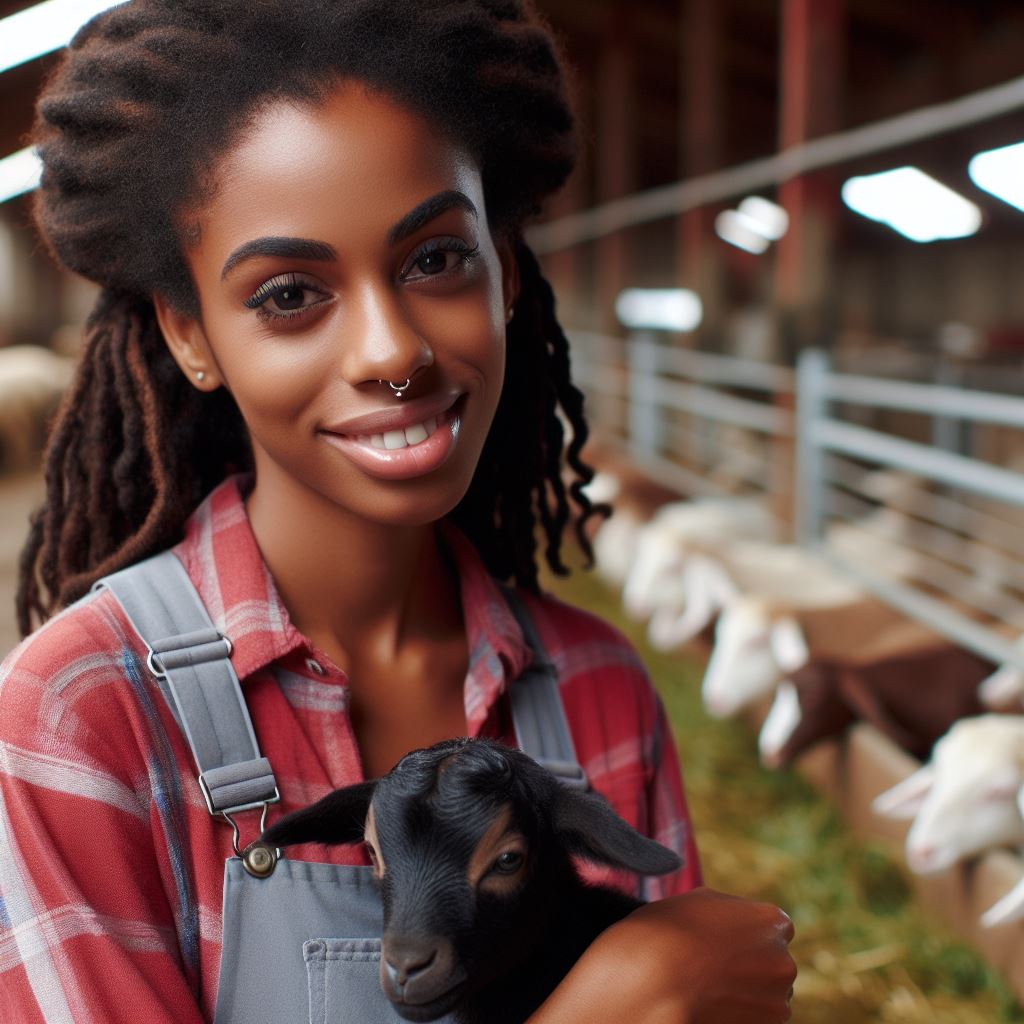Introduction
In this blog post, we will explore the Evolution of Animal Breeding Studies.
Definition and Importance of Animal Breeding Studies
Animal breeding, a science, improves traits in livestock, crucial for sustainable agriculture.
It refines genetic stock for desired characteristics.
Significance of exploring the evolution of animal breeding studies in Nigeria
Understanding Nigeria’s animal breeding journey elucidates advancements, challenges, and impacts.
This historical perspective aids current practices.
The exploration underscores the intricate relationship between culture, economy, and agricultural development.
It unravels indigenous breeding practices’ integration with modern methodologies.
Delving into the evolution unravels the societal, economic, and environmental contributions of animal breeding.
It highlights indigenous knowledge amalgamated with scientific innovations.
Uncovering this evolution sheds light on adaptive strategies, vital for the sustainability of livestock production.
It accentuates the fusion of traditional wisdom with contemporary scientific approaches.
Comprehending the trajectory offers insights into challenges faced and overcome in Nigeria’s unique context.
It showcases resilience and adaptability in improving breeding practices.
The historical narrative paves the way for informed policymaking, catering to the dynamic agricultural landscape.
It assists in crafting strategies aligning with Nigeria’s agricultural goals.
In summary, the exploration of animal breeding evolution in Nigeria serves as a crucial roadmap.
It shapes the future direction, fostering sustainable agricultural growth and development.
Pre-Colonial Era
In the pre-colonial era of Nigeria, animal breeding was deeply rooted in indigenous practices.
Indigenous communities relied on traditional breeders who played a crucial role in shaping the genetic makeup of local animal populations.
These breeders employed various selection methods to ensure the desirable traits were passed on to the next generations.
Indigenous animal breeding practices
Indigenous animal breeding practices were heavily influenced by cultural beliefs, traditions, and practical needs.
The aim was to produce animals that thrived in the local environment and met the specific requirements of the community.
Farmers selectively bred animals for traits such as strength, adaptability, resistance to diseases, and high fertility.
Role of traditional breeders and selection methods
Traditional breeders would carefully select breeding pairs based on their observations and knowledge passed down through generations.
They assessed animals’ physical characteristics, behavior, and overall performance to determine their suitability for breeding.
This process was often guided by experience and intuition, as there was a limited scientific understanding of genetics and inheritance.
Moreover, the documentation of breeding practices during the pre-colonial era was minimal.
Knowledge about animal breeding was primarily transmitted orally, with information passed down through storytelling and personal interactions.
As a result, there was a lack of systematic records and scientific documentation for future reference.
Limited scientific understanding and documentation
Despite the limited scientific understanding and documentation, indigenous animal breeding practices in Nigeria proved to be effective.
Generations of selection and breeding had led to the development of local breeds that were well-adapted to their respective environments and provided valuable resources for the communities.
The traditional breeders, with their innate understanding of the local ecosystem, had created resilient animal populations.
These animals possessed desirable traits such as drought resistance, disease tolerance, and high-quality products like milk, meat, and hides.
The indigenous communities greatly relied on these animals for sustenance and economic stability.
In essence, the pre-colonial era witnessed the evolution of animal breeding studies in Nigeria through indigenous practices.
Traditional breeders played a vital role in selecting and breeding animals to meet the specific needs of their communities.
Despite limited scientific understanding and documentation, indigenous animal breeding practices resulted in the development of locally adapted breeds with desirable traits.
These practices formed the foundation for later advancements in animal breeding studies in Nigeria.
Read: Scholarship Opportunities for Animal Nutrition Students in Nigeria
Colonial Influence
Introduction of European breeds and breeding techniques
The arrival of colonial powers in Nigeria brought about the introduction of European breeds of animals.
Transform Your Career with Expert Guidance
Get personalized mentorship consulting that’s tailored to your unique path. Our expert advice is actionable and exclusive.
Get StartedEuropean breeds such as cattle, sheep, and goats were imported to improve local stocks.
These European breeds were known for their superior traits such as better milk production and larger body sizes.
The introduction of European breeding techniques like artificial insemination and selective breeding helped improve the local livestock population.
This allowed for the creation of hybrid breeds that had superior characteristics, such as high milk yield or increased meat production.
The local farmers were taught these new breeding techniques to enhance the productivity of their animals.
Establishment of government-led breeding initiatives
The colonial government recognized the importance of animal breeding in Nigeria’s agricultural sector.
As a result, they established breeding programs and initiatives to promote the development of improved animal breeds.
These programs aimed to increase the quality and quantity of livestock for both local consumption and export.
The government set up breeding centers where improved breeds were maintained and bred to ensure the availability of quality livestock.
Through these initiatives, the government played a significant role in expanding the scope of animal breeding studies in Nigeria.
Impacts of colonization on indigenous breeds and practices
The introduction of European breeds and breeding techniques had both positive and negative impacts on indigenous breeds and practices.
The local breeds faced competition from the imported European breeds, which led to a decline in their population.
Many traditional breeding practices, deeply rooted in Nigerian culture, were gradually abandoned for the new European techniques.
However, some indigenous breeds managed to adapt and benefited from the new breeding methods.
The colonial influence created a shift in preference towards European breeds, resulting in the neglect and marginalization of some native breeds.
Some indigenous breeds that couldn’t compete with the European breeds faced the danger of extinction.
In fact, the colonial influence on animal breeding studies in Nigeria was significant. The introduction of
European breeds and breeding techniques played a crucial role in improving the quality and productivity of livestock.
The government-led initiatives further supported the development of animal breeding in the country.
However, this influence also had negative consequences, including the decline and marginalization of indigenous breeds and practices.
It is important to recognize and preserve the genetic diversity of native breeds to ensure their long-term survival and maintain the cultural significance associated with them.
Read: Introduction to Animal Breeding & Genetics in Nigeria’s Universities
Post-Colonial Era
Emergence of Nigerian animal breeding societies and organizations
After gaining independence, Nigeria witnessed an increased focus on animal breeding studies.
Nigerian animal breeding societies and organizations emerged to promote research and exchange of knowledge.
These societies, such as the Nigerian Society for Animal Production, played a crucial role in advancing animal breeding studies.
They organized conferences, seminars, and workshops to disseminate information and encourage collaboration.
Various specialized organizations were also established, focusing on specific animal species for breeding improvement.
The emergence of these societies and organizations contributed to the growth and development of animal breeding in Nigeria.
Adoption of modern scientific breeding methods
The post-colonial era saw the adoption of modern scientific breeding methods in Nigeria.
These methods include artificial insemination, genetic selection, and molecular genetics.
Researchers and breeders began incorporating advanced techniques to improve animal productivity and traits.
The use of artificial insemination increased the efficiency and precision of breeding programs.
Genetic selection allowed for the identification and propagation of superior traits in livestock.
Molecular genetics facilitated the understanding of genetic makeup and enabled targeted breeding strategies.
Government policies and investments in animal breeding research and facilities
The Nigerian government recognized the importance of animal breeding in agricultural development.
Policies were formulated to support and regulate animal breeding activities in the country.
Research institutions and facilities dedicated to animal breeding studies received significant investments, fostering advancements in the field.
These investments aimed to enhance infrastructure, provide funding for research projects, and promote collaboration.
Government initiatives focused on improving livestock breeds, disease resistance, and overall productivity.
The establishment of specialized research centers and laboratories further strengthened the animal breeding sector in Nigeria.
In short, the post-colonial era marked a significant growth in animal breeding studies in Nigeria.
The emergence of Nigerian animal breeding societies and organizations provided a platform for knowledge exchange and research collaboration.
The adoption of modern scientific breeding methods, such as artificial insemination and genetic selection, contributed to the improvement of animal traits and productivity.
Government policies and investments played a crucial role in supporting and advancing animal breeding research, leading to the establishment of specialized institutions and facilities.
This era paved the way for further developments in animal breeding in Nigeria, ensuring sustained progress in agricultural production and food security.
Read: Agronomy Internships: Top Opportunities in Nigeria Today

Challenges and Constraints
In the evolution of animal breeding studies in Nigeria, several challenges and constraints have hindered the progress of this field.
These issues have limited the ability to conduct comprehensive research and have slowed down the development of the sector.
This section will explore some of the main challenges faced in the advancement of animal breeding studies in Nigeria.
Lack of infrastructure and resources
Insufficient infrastructure and resources have significantly impeded Nigeria’s progress in animal breeding studies.
The absence of well-equipped laboratories, research facilities, and breeding centers has made it difficult to carry out extensive research and experiments.
Limited access to modern technology and equipment has hindered the ability to effectively study and improve animal breeding practices.
Limited research funding and facilities
Another significant constraint faced by animal breeding studies in Nigeria is the limited availability of research funding and facilities.
Adequate financial support is essential for conducting in-depth studies and implementing effective breeding programs.
However, the inadequate allocation of funds for research purposes has resulted in a lack of resources to support the necessary infrastructure and staffing needs.
Insufficient collaboration between academia, industry, and government
The lack of collaboration between academia, industry, and government has been a major obstacle to the advancement of animal breeding studies in Nigeria.
The academia’s valuable research findings often fail to reach the industry and government sectors for practical implementation.
There is a need for strong collaboration and knowledge-sharing between these key stakeholders to bridge the gap between research and application.
Addressing these challenges and constraints
To address these challenges and constraints, several measures can be taken:
Increased investment in infrastructure development
The Nigerian government should prioritize the development of infrastructure and provide adequate resources to support animal breeding studies.
This includes establishing modern laboratories, research facilities, and breeding centers equipped with the latest technology and equipment.
Enhanced research funding
Provision of increased research funding is crucial for carrying out comprehensive studies and implementing effective breeding programs.
Adequate financial support will enable researchers to conduct trials, analyze data, and develop practical breeding strategies.
Promotion of collaboration and partnerships
There is a need for synergy between academia, industry, and government.
Establishing collaborations and partnerships will facilitate the exchange of information, expertise, and resources.
To ensure effective translation of research findings, we must apply them practically, enhancing animal breeding practices.
Capacity building and training
Investing in human capital development is essential to overcome the challenges faced in animal breeding studies.
Researchers, breeders, and technicians require training for improved skills and knowledge in modern animal breeding techniques.
Public-private partnerships
Encouraging public-private partnerships can provide the necessary financial and technical support for animal breeding studies.
Collaborating with private sectors unlocks resources and expertise, driving innovation and enhancing breeding practices significantly.
Addressing the challenges and constraints in animal breeding studies in Nigeria is crucial for the development of the sector.
By investing in infrastructure, research funding, collaboration, and capacity building, Nigeria can overcome these obstacles and make significant progress in enhancing animal breeding practices.
Various challenges hinder animal breeding studies in Nigeria: lack of infrastructure, resources, research funding, facilities, and collaboration gaps between sectors.
To overcome these constraints, it is necessary to invest in infrastructure development, enhance research funding, promote collaboration and partnerships, provide capacity building and training, and encourage public-private partnerships.
By addressing these issues, Nigeria can make substantial advancements in the field of animal breeding studies.
Read: Student Experiences: Life as an Animal Nutrition Major in Nigeria
Recent Developments
Technological advancements in animal breeding studies
- Integration of advanced reproductive techniques has revolutionized animal breeding studies.
- Artificial insemination and embryo transfer techniques have greatly improved breeding efficiency.
- Genetic engineering tools enable precise modification of animal genomes for desirable traits.
- Modern technologies like genotyping and DNA sequencing have accelerated genetic selection processes.
- The use of computer models and simulation software has enhanced breeding program management.
- Advanced genomic tools allow for the identification of disease-resistant and high-yielding animal varieties.
Enhanced focus on breed improvement and genetic resources conservation
- Nigeria has placed greater emphasis on preserving and improving indigenous animal breeds.
- Efforts have been made to develop breed-specific conservation programs for endangered local breeds.
- Strict regulations have been implemented to prevent the uncontrolled importation of foreign breeds.
- Conservation measures include the establishment of gene banks and cryopreservation of germplasm.
- Specialized breeding centers and research institutes have been established to support breed improvement.
- Farmer education programs have been initiated to promote sustainable breeding practices and genetic diversity.
Successful case studies and contributions to Nigeria’s agriculture sector
- Selective breeding of poultry and livestock has resulted in increased productivity and improved quality.
- The introduction of genetically improved cowpea varieties has enhanced crop yields and food security.
- Nigeria’s adoption of crossbreeding strategies has led to the development of superior meat and milk-producing animals.
- Successful breeding programs have played a crucial role in boosting the country’s livestock export industry.
- Improved animal breeds have provided small-scale farmers with better livelihood opportunities.
- Breed improvement initiatives have contributed to the overall growth and sustainability of Nigeria’s agriculture sector.
In review, the recent developments in animal breeding studies in Nigeria have been remarkable.
Technological advancements have revolutionized the field, leading to increased breeding efficiency and the identification of desirable traits.
The focus on breed improvement and genetic resources conservation has helped preserve indigenous breeds and enhance their productivity.
Additionally, successful case studies have made significant contributions to Nigeria’s agriculture sector, improving food security and providing livelihood opportunities for farmers.
Nigeria’s continued investment in animal breeding studies is crucial for the sustained growth and development of its agricultural industry.
Future Prospects
Potential impact of genetic engineering and biotechnology
- Genetic engineering and biotechnology have the potential to revolutionize animal breeding practices in Nigeria.
- These technologies can be used to enhance desired traits such as disease resistance and productivity.
- Through genetic modification, animals can adapt better to local environmental conditions.
- Genetic engineering also offers the possibility of developing new breeds that are better suited for specific purposes.
- These advancements can significantly improve livestock production and contribute to food security in Nigeria.
Opportunities for international collaboration and knowledge exchange
- Nigeria can benefit from international collaboration and knowledge exchange in animal breeding studies.
- Partnerships with other countries can provide access to advanced technologies and expertise.
- International collaboration fosters the exchange of ideas, methodologies, and best practices.
- Joint research projects can accelerate progress and lead to innovative breeding strategies.
- Such collaborations can also open doors for funding opportunities and create a global network of researchers.
Importance of sustainable and inclusive breeding practices for agricultural development
- Adopting sustainable breeding practices is crucial for long-term agricultural development in Nigeria.
- These practices promote environmental conservation and minimize negative impacts on ecosystems.
- Inclusive breeding practices ensure that all stakeholders, including small-scale farmers, benefit from advancements.
- By involving local communities, traditional knowledge can be integrated into breeding programs.
- Sustainable and inclusive breeding practices lead to more equitable and resilient agricultural systems.
In a nutshell, the future prospects of animal breeding studies in Nigeria are promising.
Genetic engineering and biotechnology hold great potential in enhancing livestock production by improving traits and developing new breeds.
International collaboration and knowledge exchange provide opportunities for accessing advanced technologies and fostering innovation.
Additionally, sustainable and inclusive breeding practices are crucial for long-term agricultural development, ensuring equity and resilience.
With continued research and implementation of these prospects, Nigeria can further strengthen its animal breeding sector and contribute to sustainable food production.
Conclusion
A historical view unveils Nigeria’s animal breeding journey. Pioneers laid groundwork, sparking growth in breeding methodologies.
The evolution saw traditional practices blend with modern science, enhancing livestock quality.
Throughout history, Nigeria’s animal breeding faced challenges. Limited resources hindered progress, yet resilience prevailed.
Researchers pioneered indigenous breeds’ preservation and improvement.
Efforts bore fruits. Livestock productivity surged, meeting diverse needs. Livestock keepers gained insights, fostering sustainable practices.
Collaborations between academia, government, and local breeders propelled advancements.
This historical narrative highlight pivotal moments. From indigenous breed recognition to the integration of biotechnological approaches, progress emerged.
The synergy between traditional knowledge and scientific innovation shaped Nigeria’s animal breeding landscape.
However, the journey isn’t over. Continuous efforts remain imperative. Advancing animal breeding is pivotal for national development.
A clarion call resounds for sustained investments in research, technology, and education.
Nigeria stands at a crossroads. Leveraging the potential of animal breeding holds immense promise.
Economic growth, food security, and livelihood improvement hinge on these endeavors.
The future demands a holistic approach. Strengthening breeding programs, enhancing infrastructure, and fostering knowledge exchange are critical.
Collaboration across sectors and embracing emerging technologies will propel the field forward.
As this historical exploration concludes, a resounding message echoes. Nigeria’s animal breeding evolution signifies resilience, progress, and potential.
Continuous dedication and innovation are essential for a thriving future.
The historical evolution of animal breeding in Nigeria illuminates a path forward.
It underscores the need for relentless commitment to advance the field.
Embracing this legacy ensures a prosperous future for Nigeria’s livestock industry and national development.




